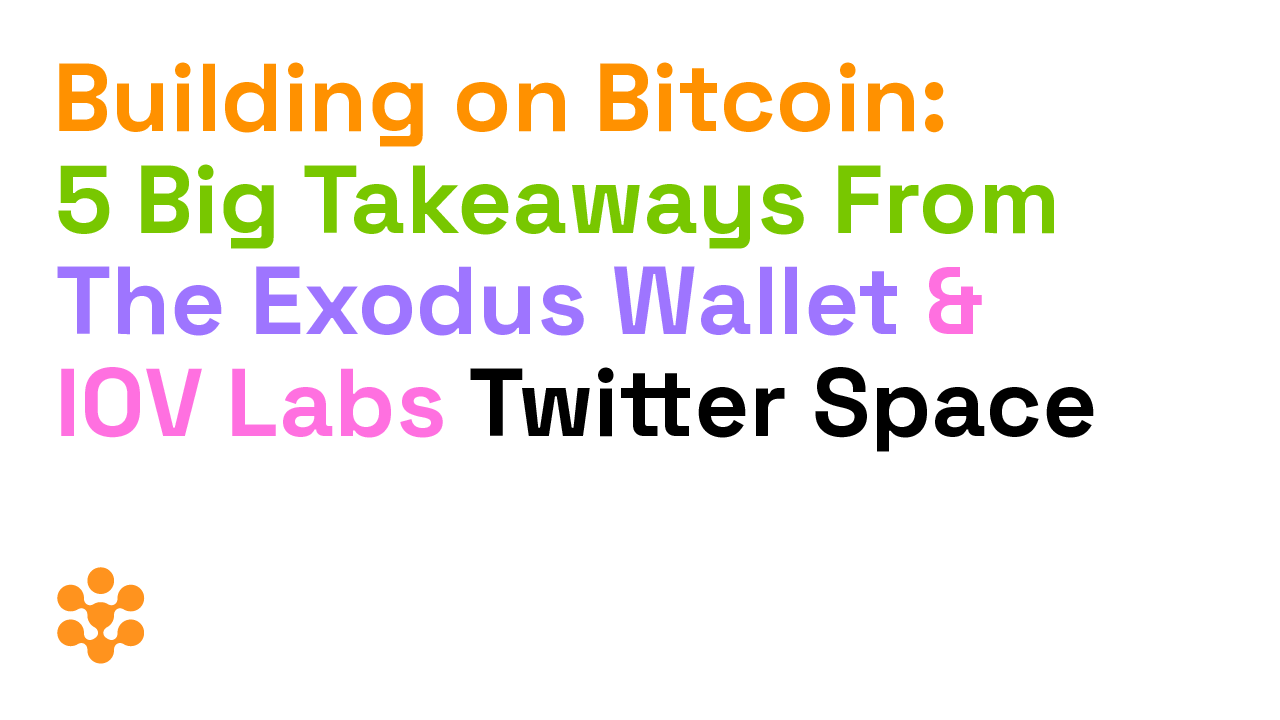Building on Bitcoin: 5 Big Takeaways From The Exodus Wallet & IOV Labs Twitter Space


Cryptocurrency enthusiasts and blockchain visionaries JP Richardson, CEO of Exodus Wallet, and Daniel Fogg, CEO of IOV Labs recently came together for a discussion on X Space to discuss a range of topics from across the world of Web3 including how UX is holding up mass adoption, why Exodus chose to add Rootstock to its wallet and why Bitcoin Matters.
Here are five takeaways from their conversation that shed light on the evolving landscape of cryptocurrency and its profound impact on the financial world.
Listen to the whole conversation on X now.
Why Bitcoin Matters and Rootstock’s DeFi Revolution
Bitcoin remains a cornerstone of the crypto world. It is seen as the most decentralized and immutable store of wealth. Still, scalability and functionality issues have led to the proliferation of various chains and tokens designed to address these challenges.
As a Bitcoin sidechain, Rootstock has instead been built on top of Bitcoin to bring programmability, scalability and smart contract functionality to the network. This allows for a range of DeFi apps and services to be used by people around the world with Bitcoin as the native asset.
JP explained why Exodus Wallet chose to add Rootstock to its wallet: “Rootstock has built this EVM compatibility layer for Bitcoin, and I just don’t think the world knows that yet… And so we thought that there would be a good opportunity for us to tap into that. And start early, start at the base, and help to be a part of the story of making Bitcoin and Rootstock a success. So that’s kind of how we thought about it early on. “
Debunking Drivechain Criticism: The Tokenization of Stocks and Real World Assets
“And so right now, a lot of people don’t know this, but Exodus is the only company in the United States that has our common stock tokenized on the blockchain.” – JP Richardson
The discussion moved on to the ongoing debate around bitcoin drivechains and how blockchain technology could increase the security and accessibility of investing in stocks and real-world assets.
“Some people’s criticism with drivechains is that we don’t need shitcoins on Bitcoin…But what people are missing is that there are real assets that are not shitcoins… And, and one really fine example that not a lot of people think of is equities. Stocks.
I don’t think anybody would look at Apple stock or Tesla stock say, oh, that’s a shitcoin. Nobody would say that. That would be insane. – JP Richardson
Real-World Use Cases: Beyond Speculation
The conversation touched on the significance of crypto in solving real-world problems, such as sending money abroad, protecting against inflation, and accessing stablecoins, demonstrating the growing importance of cryptocurrency beyond speculation.
Daniel highlighted these use cases, saying, “Getting access to US dollars through the means of stablecoins is also something super important. But I think for various reasons these needs are often neglected by a lot of the builders in the space… sending money to a family member overseas or getting inflation protection which has always been a big issue in Argentina, but now increasingly an issue in other countries around the world, like, like Turkey, Nigeria and Colombia, and even to be perfectly honest in the UK, where we’re also dealing with inflationary pressure at the moment.
The interview also touched upon more day-to-day ways crypto could be used such as buying gift cards with services like BitRefill, to which JP added “Exodus is the number one used wallet to buy gift cards with Bitcoin. And so, I think that continues to show that people today are using Exodus for some of these [real-world] use cases.”
Usability and Improved User Experience (UX)
“I went on a bit of a wallet odyssey, downloaded like 50, 60 different crypto wallets, tried them all, quickly realized that most of them offered the same features, but the UI and UX were pretty poor… I ended up with basically a very small handful that I was like, these ones are awesome. And Exodus was on that list” – Daniel Fogg
When speaking about creating accessibility, Daniel and JP delved into how the crypto industry is evolving, with a growing focus on enhancing user experience. It’s becoming clear that simplifying complex concepts like seed phrases is crucial to mainstream adoption. And when it comes to cryptocurrency wallets, it is a must that they become user-friendly, abstracting away technical complexities to encourage broader participation.
“Something as simple as taking out a loan or earning interest on your wealth should really just be done with a tap of a button. It should be super simple. So we’ve gone down the path of experimenting in different ways on how to really make this happen.” – JP Richardson
The Future of Crypto: What Lies Ahead
“I was talking to someone a couple of days ago. They were asking: what would crypto wallets look like in 10 years time? And I was sort of saying, well, they’d probably either look like your bank, or your bank is going to start to look like your crypto wallet, or in fact, you’re probably not even aware that you’re accessing crypto rails at all. In theory, it should just fade into the background.” – Daniel Fogg
Finally, the interview highlighted the need for crypto to seamlessly integrate into existing technology usage patterns.
According to the two CEOs, the future involves enabling users to interact with decentralized services without requiring in-depth knowledge. The industry is poised to make crypto transactions as simple as using traditional banking services.
From Bitcoin’s enduring significance to the tokenization of real-world assets and improving usability, these takeaways offer a glimpse into the exciting future of cryptocurrency. As crypto continues to innovate and simplify, it holds the potential to transform global finance and empower individuals worldwide.



